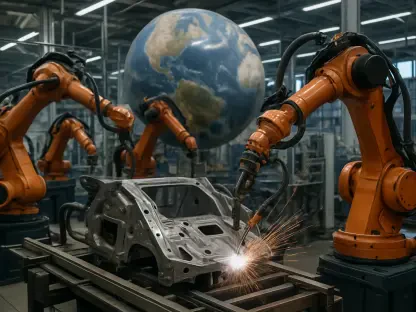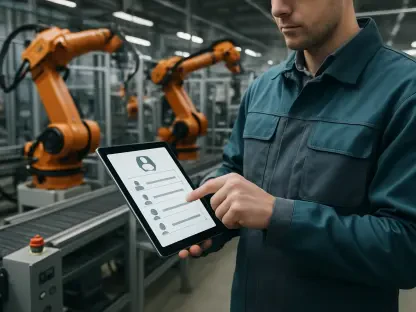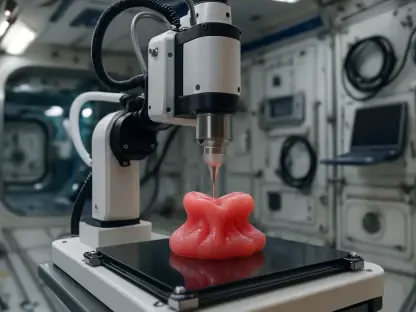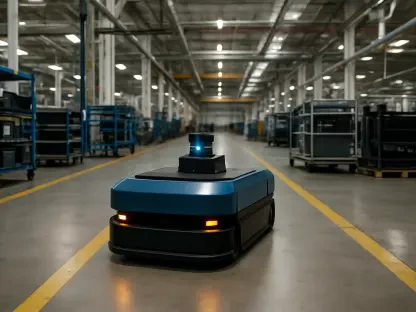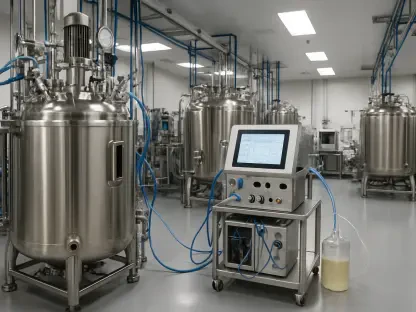Artificial intelligence (AI) has become a transformative force in various industries, promising unprecedented levels of efficiency, automation, and innovation. Manufacturers are particularly enthusiastic about the potential benefits AI can bring, seeing it as a pivotal element in gaining a competitive edge. A global survey conducted by Riverbed’s Global AI & Digital Experience Survey highlights a significant disparity between manufacturers’ optimism for AI and their actual preparedness to deploy it. Despite 92% of manufacturing leaders recognizing AI as a top priority and a potential competitive advantage, only 32% feel fully equipped to initiate AI projects. This readiness gap places manufacturers behind other industries by five percentage points.
Core Challenges Hindering AI Adoption
Three principal challenges obstruct the adoption of AI within the manufacturing sector. Firstly, there exists a reality gap, which is a discrepancy between the perceived maturity of AI capabilities within organizations and the actual state of AI readiness. Manufacturers may believe they are further along in their AI journey than they truly are, which hinders effective implementation. This misalignment creates a false sense of security, potentially leading to underinvestment in critical areas necessary for AI success.
Secondly, there is a readiness gap linked to inadequate infrastructure and planning. Manufacturers often lack the necessary infrastructure to support robust AI initiatives. This includes technological frameworks such as cloud computing, high-speed data processing capabilities, and advanced cybersecurity measures. Proper planning is also crucial; without a clear, strategic outline for AI deployment, manufacturers face difficulties in integrating AI into their everyday operations and achieving desired outcomes.
Lastly, the data gap involves issues related to data quality and usability. The effectiveness of AI heavily depends on the availability of high-quality, relevant data. Poor data quality can significantly impede AI’s performance, leading to inaccurate predictions, misguided strategies, and overall inefficiency. Jim Gargan, CMO of Riverbed, emphasized the importance of enhancing data quality and utilizing observability tools to maximize AI’s potential. Despite these challenges, the confidence in AI remains robust, with 97% of manufacturing leaders believing AI will enhance digital experiences for end users, and 89% viewing AI automation as essential for maximizing IT efficiency.
Generational Attitudes and Investments in AI
Generational perspectives play a crucial role in AI adoption. Millennials and Gen Z are generally seen as more comfortable with AI, with 45% of survey respondents citing these generations as key players in successful AI integration. Their familiarity and adaptability to new technologies position them as vital contributors to advancing AI in manufacturing settings. This generational support is instrumental in overcoming resistance to change and ensuring smoother transitions into AI-driven operations.
Moreover, the survey indicates substantial investments in AI infrastructure and talent among manufacturers. More than half (56%) of the respondents are already allocating resources to enhance their AI capabilities. Investment in AI ensures manufacturers are not left behind in this technological revolution. From recruitment of skilled AI professionals to bolstering existing technological infrastructure, these efforts represent significant steps towards a future where AI plays an integral role in manufacturing processes.
Interestingly, 29% of respondents have integrated AI into their operations, showcasing initial successes and paving the way for broader adoption. Common AI applications within manufacturing include workflow automation (80%), automated remediation (69%), and 24/7 support tools such as chatbots (63%). These applications highlight AI’s versatility in addressing various operational needs, thereby enhancing efficiency and productivity across the board.
Future Prospects and Strategic Evolution
Looking towards the future, manufacturers anticipate a transformative shift in AI’s role. Currently, AI is predominantly viewed as a tool for enhancing efficiency, with 58% of respondents emphasizing this aspect. However, a notable shift is predicted over the next few years, with 65% expecting AI to predominantly drive growth by 2027. This evolution indicates a strategic pivot in AI utilization, from merely improving existing processes to actively catalyzing expansion and innovation.
By embracing AI for growth, manufacturers can unlock new opportunities for market penetration, product development, and customer engagement. The survey, which included 1,200 decision-makers with 200 from the manufacturing sector, reveals a consensus that mere enthusiasm will not suffice to bridge the gap between AI vision and its practical realization. Comprehensive planning, investment, and ongoing refinement of AI strategies are imperative for manufacturers aiming to harness AI effectively.
Key Takeaways and Path Forward
Artificial intelligence (AI) has emerged as a transformative force across a variety of industries, bringing promises of unprecedented efficiency, automation, and innovation. Among these industries, manufacturers are particularly excited about the potential advantages that AI offers, viewing its implementation as crucial for maintaining a competitive advantage. This enthusiasm is reflected in Riverbed’s Global AI & Digital Experience Survey, which reveals a notable gap between manufacturers’ optimism and their actual readiness to implement AI technology. While 92% of manufacturing leaders identify AI as a top priority and a means to gain a competitive edge, only 32% believe they are adequately prepared to launch AI initiatives. This disparity results in manufacturers lagging by five percentage points behind other sectors in terms of AI readiness. Addressing this readiness gap will be essential for manufacturers to fully realize the benefits AI can bring and to catch up with advancements seen in other industries.



